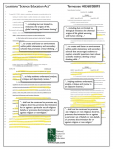 (click to embiggen)
(click to embiggen)A Tennesseean Nobel laureate in science, Stanley Cohen, already denounced (PDF) Tennessee's "monkey bills" as promising to "miseducate students, harm the state's national reputation, and weaken its efforts to compete in a science-driven global economy." But what would his fellow laureates say? Well, no fewer than seventy-five Nobel laureates in science have endorsed the effort to appeal Louisiana's antievolution law — Louisiana Revised Statutes 17:285.1, which implemented the so-called Louisiana Science Education Act, passed and enacted in 2008.
In a letter to the Louisiana legislature, seventy-four of the laureates urged the repeal of the law, saying that it "creates a pathway for creationism and other forms of non-scientific instruction to be taught in public school science classrooms," and reminding the legislature that "[b]ecause science plays such a large role in today's world and because our country's economic future is dependent upon the United States' retaining its competitiveness in science, it is vital that students have a sound education about major scientific concepts and their applications."
But the Tennessee legislation (PDF) is not significantly different from the Louisiana law. Both misdescribe evolution, the origins of life, and global warming as scientifically controversial — even though the major national scientific organizations have said that they are not. Both disclaim any intention to promote religion — even though their main lobbyists and their legislative supporters have repeatedly revealed their true motivations. And both purport to help teachers aid their students — even though the main organizations of science teachers in both states have consistently opposed the bills.
The Tennessee House of Representatives is presently scheduled to consider the Senate version of the bill (now officially known as House Bill 368) on March 26, 2012. If the House passes HB 368, it will be sent to the desk of Governor Bill Haslam, who previously indicated that he wanted to discuss the bill with the state board of education, telling the Tennesseean (March 19, 2012), "It is a fair question what the General Assembly's role is ... That's why we have a state board of education." Haslam will have ten days to decide whether to sign the bill, let it pass into law without his signature, or veto it.
